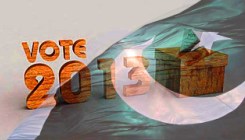By Shastri Ramachandaran* | IDN-InDepth NewsAnalysis
NEW DELHI (IDN) – In a country of coups, where generals take precedence over political parties, democratic transition can be a fraught affair. So it is in Pakistan as it prepares to elect, on May 11, a new 342-member National Assembly and four provincial assemblies of Punjab, Sindh, Khyber Pakhtunkhwa and Balochistan.
Elections bring out the best – such as the two women in northwest Pakistan who have created history as the first tribal women to file their nominations – as well as the worst in any polity. If these women represent the fearless, aspirational face of a generation’s faith in Pakistan’s democracy, there are also the cheerless dimensions of terrorism, intimidation and religious intolerance casting their shadow over the election and its outcome. Regardless of the fears and apprehensions stirred by the terrorist strikes and religious extremism, the elections in Pakistan are unlikely to be derailed.
For all the violence of the Tehrik-e-Taliban Pakistan (TTP), especially against the Awami National Party (ANP) – which ruled Khyber Pakhtunkhwa from 2008 until the assembly’s dissolution for the elections – and the TTP’s bid to scare people away from the Pakistan People’s Party (PPP) and the Muttahida Quami Movement (MQM), none has retreated from the poll arena.
Nor have contenders been put off by the returning officials’ insistence on Islamic “values” of the Zia-ul-Haq era – from 1978 until 1988. Zia-ul-Haq was a Pakistani general who served as the sixth President of Pakistan, having declared martial law for the third time in the country’s history in 1977.
The reasons for rejecting nominations, such as a candidate’s ignorance of Quranic verses or his not sporting a beard, is almost laughable.
Imponderables
In this first-ever election where a civilian government would hand over office to another elected one, imponderables are only to be expected. Naturally, the three key players, i.e. the political parties, the armed forces and religious outfits will try every trick in the book to tilt the balance in their favour.
The civilian government was able to complete its term because the political parties and the army agreed on the terms of power distribution: the generals would allow the civilian government a free hand in dealing with the domestic situation, including the economy, so long as the army prevails in the matter of internal security, particularly in dealing with terrorism. On the foreign front, the civilian establishment could make and pursue policies so long as dealing with India, Afghanistan and the US remained the policy prerogative of the army.
In such an implicit arrangement, the armed forces retained their primacy in areas where it matters and civilian authority was not undermined or rendered effete in spite of judicial activism, which tended to weaken the elected elite.
The unasked, but ever-present, question in this election is whether this tacit agreement between the political parties and the army would ensure a healthy democratic transition?
The odds are stacked against the political parties, as revealed by a recent survey in Pakistan, which found that a majority of youth – 94 percent – think the country is headed in the “wrong direction” (meaning electoral democracy) and want the Sharia to prevail. The religious and conservative young majority believes that, more than the political parties or the army, a Sharia regime can ensure moral conduct, eliminate corruption and meet people’s survival needs such as water, food, electricity, education and healthcare.
In more than half of Pakistan’s 66-year-history, the military has ruled the country through coups or from behind the scenes. It sets security and foreign policy, even when civilian governments are in power. With the army being the preferred ally of those rooting for an Islamic order, if the elections throw up a hung parliament or preclude formation of a stable civilian government, the generals may be tempted to step in again. In making such a move, the army may well depend on the support of conservative religious forces.
If the elections thwart such a scenario, Pakistan would have taken a big step forward.
Former President Pervez Musharraf’s disqualification from contesting the elections and his being prosecuted for treason and held in detention is unlikely to jeopardise the poll process. or so it appears on present reckoning.
*The author is an independent political and foreign affairs commentator. A version of this article appeared in DNA on April 9 and is published here by arrangement with the writer. [IDN-InDepthNews – May 1, 2013]
Image credit: The Kooza
The writer’s previous articles in IDN:
http://www.indepthnews.info/index.php/search?searchword=shastri%20ramachndran&ordering=newest&searchphrase=any
Send your comment | Subscribe to IDN newsletter
Follow us on Twitter and Facebook:
http://twitter.com/InDepthNews
http://www.facebook.com/IDN.GoingDeeper

